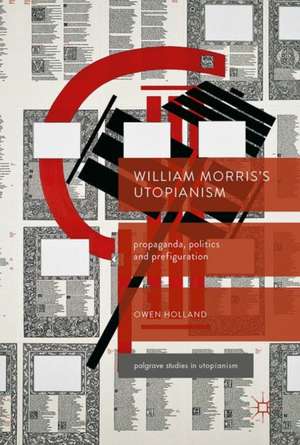William Morris’s Utopianism: Propaganda, Politics and Prefiguration: Palgrave Studies in Utopianism
Autor Owen Hollanden Limba Engleză Hardback – 18 dec 2017
This book offers a new interpretation of William Morris’s utopianism as a strategic extension of his political writing. Morris’s utopian writing, alongside his journalism and public lectures, constituted part of a sustained counter-hegemonic project that intervened both into the life-world of the fin de siècle socialist movement, as well as the dominant literary cultures of his day. Owen Holland demonstrates this by placing Morris in conversation with writers of first-wave feminism, nineteenth-century pastoralists, as well as the romance revivalists and imperialists of the 1880s. In doing so, he revises E.P. Thompson’s and Miguel Abensour’s argument that Morris’s utopian writing should be conceived as anti-political and heuristic, concerned with the pedagogic education of desire, rather than with the more mundane work of propaganda. He shows how Morris’s utopianism emerged against the grain of the now-here, embroiled in instrumental, propagandistic polemic, complicating Thompson’sand Abensour’s view of its anti-political character.
| Toate formatele și edițiile | Preț | Express |
|---|---|---|
| Paperback (1) | 726.85 lei 6-8 săpt. | |
| Springer International Publishing – 30 aug 2018 | 726.85 lei 6-8 săpt. | |
| Hardback (1) | 691.81 lei 3-5 săpt. | +24.30 lei 4-10 zile |
| Springer International Publishing – 18 dec 2017 | 691.81 lei 3-5 săpt. | +24.30 lei 4-10 zile |
Preț: 691.81 lei
Preț vechi: 864.77 lei
-20% Nou
Puncte Express: 1038
Preț estimativ în valută:
132.37€ • 138.22$ • 109.31£
132.37€ • 138.22$ • 109.31£
Carte disponibilă
Livrare economică 25 martie-08 aprilie
Livrare express 08-14 martie pentru 34.29 lei
Preluare comenzi: 021 569.72.76
Specificații
ISBN-13: 9783319596013
ISBN-10: 3319596012
Pagini: 341
Ilustrații: XI, 337 p. 5 illus.
Dimensiuni: 148 x 210 x 25 mm
Greutate: 0.57 kg
Ediția:1st ed. 2017
Editura: Springer International Publishing
Colecția Palgrave Macmillan
Seria Palgrave Studies in Utopianism
Locul publicării:Cham, Switzerland
ISBN-10: 3319596012
Pagini: 341
Ilustrații: XI, 337 p. 5 illus.
Dimensiuni: 148 x 210 x 25 mm
Greutate: 0.57 kg
Ediția:1st ed. 2017
Editura: Springer International Publishing
Colecția Palgrave Macmillan
Seria Palgrave Studies in Utopianism
Locul publicării:Cham, Switzerland
Cuprins
PART I.- ONE: Introduction: No-where and now-here.- TWO: Twentieth-century critical readings of Morris’s utopianism.- PART II.- THREE: At the cross-roads of socialism and first-wave feminism.- FOUR: The pastoral structure of feeling in Morris’s utopianism.- FIVE: Imperialism, colonialism and internationalism.- SIX: Organic and mechanical.- BIBLIOGRAPHY.- Index.
Notă biografică
Owen Holland is Career Development Fellow in Victorian and Modern Literature at Jesus College, Oxford, UK. He is also editor of The Journal of William Morris Studies.
Textul de pe ultima copertă
This book offers a new interpretation of William Morris’s utopianism as a strategic extension of his political writing. Morris’s utopian writing, alongside his journalism and public lectures, constituted part of a sustained counter-hegemonic project that intervened both into the life-world of the fin de siècle socialist movement, as well as the dominant literary cultures of his day. Owen Holland demonstrates this by placing Morris in conversation with writers of first-wave feminism, nineteenth-century pastoralists, as well as the romance revivalists and imperialists of the 1880s. In doing so, he revises E.P. Thompson’s and Miguel Abensour’s argument that Morris’s utopian writing should be conceived as anti-political and heuristic, concerned with the pedagogic education of desire, rather than with the more mundane work of propaganda. He shows how Morris’s utopianism emerged against the grain of the now-here, embroiled in instrumental, propagandistic polemic, complicating Thompson’s andAbensour’s view of its anti-political character.
Caracteristici
Advances a new interpretation of William Morris’s utopianism through an analysis of his political writings Examines the relationship between Morris’s utopianism and first-wave feminism, pastoralism, romance revivalism and imperialism Revises the Miguel Abensour and E.P. Thompson’s argument that Morris’s utopian writing should be perceived as anti-political Includes supplementary material: sn.pub/extras













